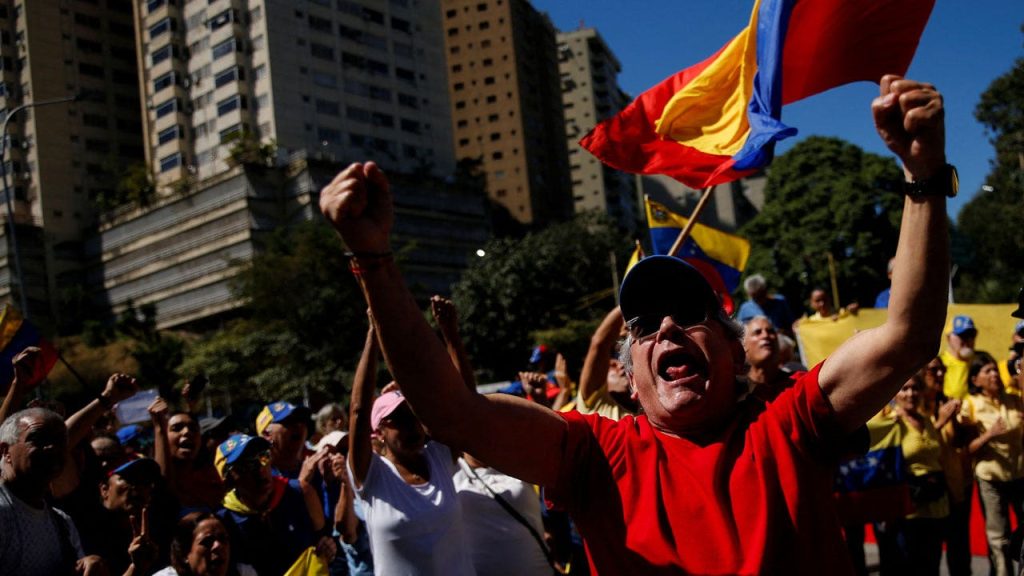Venezuela stood on the precipice of a renewed political crisis as President Nicolás Maduro prepared for his third six-year term inauguration, a tenure marred by profound economic and social turmoil. The opposition, vehemently contesting the legitimacy of Maduro’s victory in the previous year’s presidential election, launched a wave of nationwide protests on Thursday, the eve of the inauguration, in a last-ditch effort to pressure the incumbent leader. This burgeoning conflict has polarized the nation, with both the opposition and the ruling party claiming victory in the contested election. The official results, validated by the country’s electoral authority and top court, declared Maduro the winner, yet the absence of detailed tallies fueled the opposition’s accusations of electoral manipulation. This lack of transparency cast a long shadow over the democratic process, further exacerbating the existing political divide.
The opposition’s protests were marked by the unexpected reappearance of María Corina Machado, the country’s most popular opposition figure, who had been in hiding since August. Machado, barred from running in the 2024 elections, emerged from her undisclosed location to join a protest in Caracas, invigorating the opposition’s ranks. Her presence symbolized defiance against Maduro’s government and galvanized supporters to take to the streets, challenging the official election narrative. The protests also highlighted the deep-seated anxieties of the Venezuelan populace, with many expressing concerns over economic hardship, lack of opportunities, and the exodus of their children and grandchildren seeking better lives abroad. This underlying social discontent underscored the precarious nature of the political landscape and the potential for escalating tensions.
The government, however, remained steadfast in its position, accusing the opposition of orchestrating destabilizing plots. It threatened to arrest opposition leader Edmundo Gonzalez should he return to the country and detained several prominent opposition members and activists in the lead-up to Maduro’s inauguration. This firm stance signaled the government’s determination to maintain control and suppress any dissent, raising concerns about potential human rights violations and the further erosion of democratic norms. The international community, including the United States, recognized Gonzalez as the legitimate winner of the election, adding another layer of complexity to the already fraught political situation.
The protests drew thousands of Venezuelans to the streets, echoing similar demonstrations that erupted in the days following the contested election. While the opposition sought to reclaim public spaces as a symbol of their resistance, security forces maintained a heavy presence, establishing checkpoints throughout the country and swiftly dispersing protests in some areas with tear gas. This display of force underlined the government’s resolve to quell any potential uprising and maintain order, even if it meant resorting to repressive tactics. The contrasting images of protesting citizens and armed security forces painted a stark picture of the deep political chasm dividing the country.
Amid the escalating tensions, Maduro enjoyed the unwavering support of the armed forces and intelligence services, institutions led by his close allies. This loyalty, cemented by shared financial interests, significantly reduced the likelihood of a military rebellion, according to analysts. The military’s allegiance to the ruling party represented a formidable obstacle for the opposition, limiting their options for challenging Maduro’s authority. This reliance on the military underscored the crucial role of these institutions in maintaining the existing power structure, further complicating the prospects for a peaceful resolution to the political impasse.
The opposition’s claims of electoral fraud resonated with many international observers, who criticized the lack of transparency surrounding the vote count and expressed concerns over the fairness of the electoral process. This international scrutiny added to the pressure on Maduro’s government, but it remained to be seen whether it would lead to any concrete action or changes in the Venezuelan political landscape. Gonzalez, meanwhile, embarked on a tour of the Americas, seeking international support for his claim to the presidency. He met with U.S. President Joe Biden and President-elect Donald Trump’s national security advisor, highlighting his efforts to gain international recognition and legitimacy. However, his return to Venezuela remained uncertain, given the outstanding arrest warrant against him and the government’s threats of detention.

